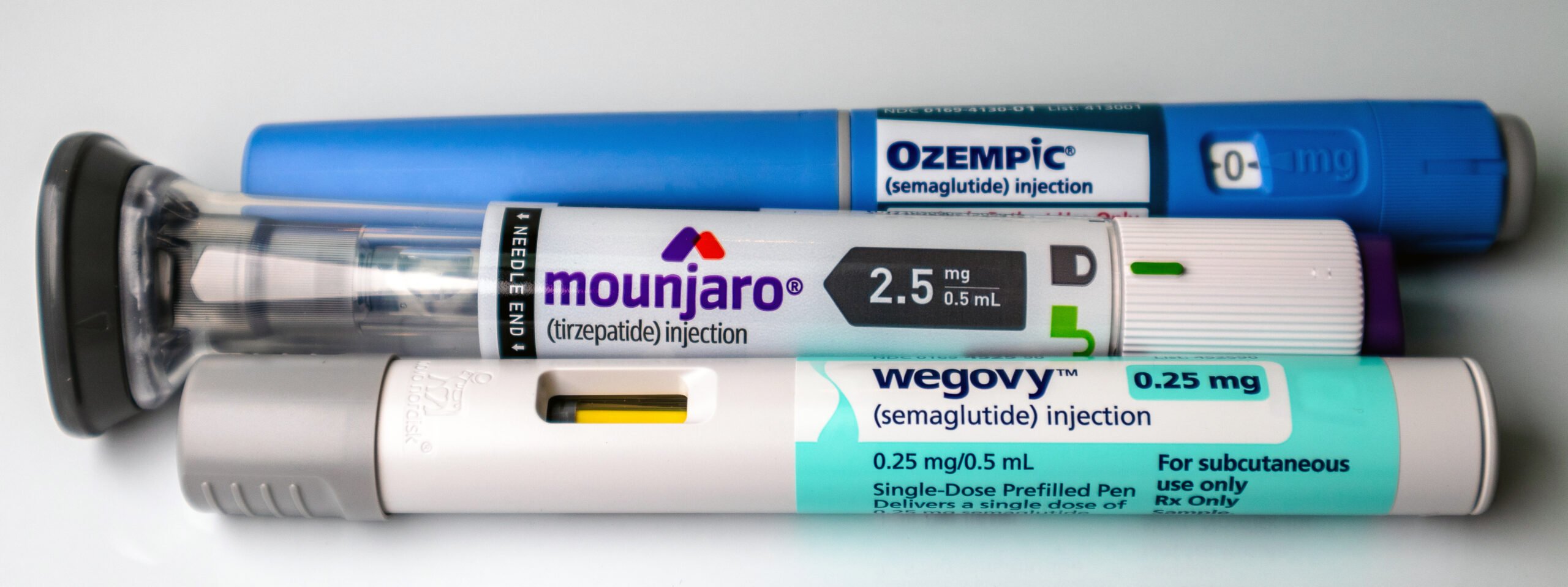
Does Ozempic Cause Hair Loss?
Ozempic, and to a lesser extent, similar drugs like WeGovy and Mounjaro, have become well-known in the media of late. While these drugs were originally devised for the treatment of type 2 diabetes, they have gained widespread attention for their use in weight loss. However, some users have been noticing an unfortunate side effect, causing many to ask: Does Ozempic cause hair loss?
In this article, we’ll be taking a look at some of the recent studies on this issue, examining if those with Ozempic-related hair loss are good candidates for hair transplant surgery, and exploring what you can do to prevent hair loss while taking semaglutide.
- What is Ozempic?
- The Link Between Ozempic and Hair Loss: What We Know
- Hair Loss and Weight Loss: A Known Connection
- Nutritional Deficiencies and Hair Health
- Hormonal Changes and Hair Loss
- Who is Most at Risk?
- What Can You Do if You Experience Ozempic Hair Loss?
- Is Ozempic Hair Loss Permanent?
- Final Thoughts
- FAQs
What is Ozempic?
While Ozempic is just one brand of semaglutide, it has become a catch-all term for all manner of “skinny jabs”, injectable diabetes medications which act as appetite suppressants. When it comes to type 2 diabetes medications that are currently being used for weight management, there are two main options – semaglutide and tirzepatide.
Semaglutide and tirzepatide are both GLP-1 receptor agonists. They work by mimicking the hormone response in the body that regulates insulin and makes us feel full. Though both were originally devised as diabetes medication, they have been thrust into the public eye of late for their use in weight management for non-diabetic patients.
The Link Between Ozempic and Hair Loss: What We Know

Despite reports from patients, currently the research shows no direct clinical evidence that definitely proves that Ozempic causes hair loss, no do any of the other popular brands of semaglutide and tirzepatide. Neither hair thinning nor hair loss are listed as common side effects for the medications.
However, that is not to say that those prescribed these medications can not or will not experience hair loss. While the hair loss may not be caused by the medications themselves, it is very likely that people taking semaglutide or tirzepatide may be losing hair due to rapid weight loss and metabolic changes.
Hair Loss and Weight Loss: A Known Connection
Research has proven a link between rapid weight loss and hair loss. The stress on the body that such dramatic weight loss can cause can result in temporary hair shedding, known as telogen effluvium. Whenever the body experiences physical stress, it is common for the hair follicles to enter the resting (telogen) phase of the growth cycle prematurely. This results in hair loss and noticeable thinning.
When people lose weight quickly – whether through dieting, surgery, or medications like Ozempic – this can put the body under stress. A patient’s decreased appetite may also account for a loss in vital nutrients, which additionally can affect hair health. So, while Ozempic itself may not cause hair loss, the resulting weight loss could be the culprit.
Nutritional Deficiencies and Hair Health
When using any weight loss method, it is crucial that you are still consuming requisite nutrition to meet your body’s needs. The same applies for those who are using Ozempic. Hair follicles require a consistent supply of nutrients in order to function properly and keep your hair healthy. When someone is deficient in these nutrients, it is common for hair loss to occur.
Common deficiencies linked to hair loss include:
- Iron
- Zinc
- Biotin
- Protein
Ozempic is just one piece of a puzzle in what ought to be a broader lifestyle change to manage weight. A balanced diet still plays a key role in both weight loss and maintaining the body’s healthy functions. It is important to remember that there is more to health than just weight, and patients should pay close attention to their nutritional intake if they wish to avoid hair loss.
Hormonal Changes and Hair Loss
Another theory that might account for Ozempic hair loss is hormonal activity. Weight loss can influence hormone levels, and in particular can impact thyroid function and oestrogen balance – both of which play a significant role in hair health. This would also account for the fact that, according to current research, the majority of patients reporting hair loss symptoms are female.
For example, hypothyroidism (low thyroid function) is a known cause of hair loss, and if undiagnosed or poorly managed may be aggravated during periods of metabolic change, such as extreme weight loss. If someone has an underlying hormone imbalance, Ozempic might indirectly exacerbate hair shedding by accelerating these shifts.
Who is Most at Risk?
Although anyone can experience side effects from Ozempic, the following groups may be more prone to hair thinning:
- Women, who are statistically more likely to experience telogen effluvium
- Individuals experiencing rapid weight loss
- Those on restricted or low-calorie diets
- People with pre-existing thyroid conditions or anaemia
If you are considering pursuing semaglutide or tirzepatide as a weight loss treatment, it is important to flag any underlying issues with your GP so that you can manage any pre-existing conditions and ensure that you are consuming sufficient nutrition.

What Can You Do if You Experience Ozempic Hair Loss?
If you’ve noticed increased shedding or thinning hair since starting Ozempic, don’t panic. There are several steps you can take to address the issue and support healthy regrowth.
1. Speak to Your Doctor
Your doctor should be your first port of call when experiencing any Ozempic side effects. They will be able to determine the cause of your hair loss and advise you on how to treat the issue.
2. Eat a Balanced Diet
With Ozempic’s appetite-suppressing effects, it is more important than ever to prioritise quality over quantity. Make sure that the food you eat contains the requisite nutrients needed to keep your body functioning optimally. Here are some foods to include to ensure adequate nutrition:
- Protein (e.g., lean meats, legumes, eggs)
- Iron (e.g., spinach, red meat, lentils)
- Zinc (e.g., pumpkin seeds, shellfish)
- B vitamins, particularly biotin
- Omega-3 fatty acids
3. Consider Supplements
If you find it difficult to include the above foods in your diet, or if you find they are insufficient in providing nutrients in the levels required to maintain healthy hair, supplements are an effective way of meeting your body’s needs while you lose weight. Consider taking the following supplements for hair health:
- Biotin
- Collagen
- Vitamin D
- Iron (if deficient)
Before starting any supplements, we recommend first consulting your doctor.
4. Take Care of Your Scalp
Think of the scalp as the foundation for healthy hair. By avoiding hair products with sulphates and parabens, focusing instead on gentle and natural ingredients, you can give your hair follicles the best chance at functioning well. Regular scalp massages can also improve blood flow, allowing key nutrients to be distributed to your follicles.
Is Ozempic Hair Loss Permanent?
For the most part, no, Ozempic related hair loss is not permanent. Telogen effluvium is a temporary condition that often goes away on its own once your weight loss plateaus and your body’s functions resume equilibrium. Typically, you can expect hair loss to return within a few months. Therefore, we would not consider someone with Ozempic-related hair loss to be a candidate for a hair transplant.
However, sustained periods of dramatic weight loss or ongoing deficiencies can lead to long-term issues. Therefore, it is crucial to act quickly when you notice you are suffering from hair loss and to treat the issue at its source with the help of your doctor.
Final Thoughts
There is currently no direct link between Ozempic and hair loss, but many users of the medication have reported hair thinning and loss. To date, the research on this issue suggests that the hair loss is caused by dramatic weight loss, nutritional imbalances, and hormonal activity.
If you are considering a course of semaglutide or tirzepatide, be sure to discuss your concerns about hair loss with your doctor. Working together, you can devise a treatment plan that will include sufficient nutrition and scalp care that will off-set some of the risk of hair loss.
FAQs
How long after starting Ozempic might hair loss begin?
Hair loss associated with rapid weight loss, such as telogen effluvium, typically occurs two to three months after the trigger. If Ozempic is contributing indirectly through weight loss, patients may begin to notice hair shedding within this timeframe.
Will stopping Ozempic stop the hair loss?
Stopping Ozempic may help reduce hair loss if the shedding is linked to continued weight loss or nutritional deficiency. However, hair regrowth also depends on restoring nutritional balance and addressing any underlying issues, not just discontinuing the medication.
Can I prevent hair loss while taking Ozempic?
Yes, by taking a proactive approach to nutrition, scalp care, and regular medical monitoring, you can reduce the risk. Ensuring adequate intake of iron, protein, biotin, and other essential nutrients is key, as is managing weight loss at a moderate pace.
Should I pause Ozempic if I experience hair loss?
Do not stop the medication without medical advice. Consult your doctor to determine the cause of the hair loss and whether any adjustments need to be made to your treatment plan or nutritional support.
How can I tell if the hair loss is due to Ozempic or another cause?
A medical professional can help identify the cause through a review of symptoms, blood tests (e.g., iron levels, thyroid function), and your medical history. Hair loss related to Ozempic tends to be diffuse thinning rather than patchy or patterned loss.
Is hair regrowth guaranteed after telogen effluvium?
In most cases, yes, hair regrows once the body has recovered from the stressor. However, regrowth may take three to six months, and texture or thickness might initially differ from your original hair.


